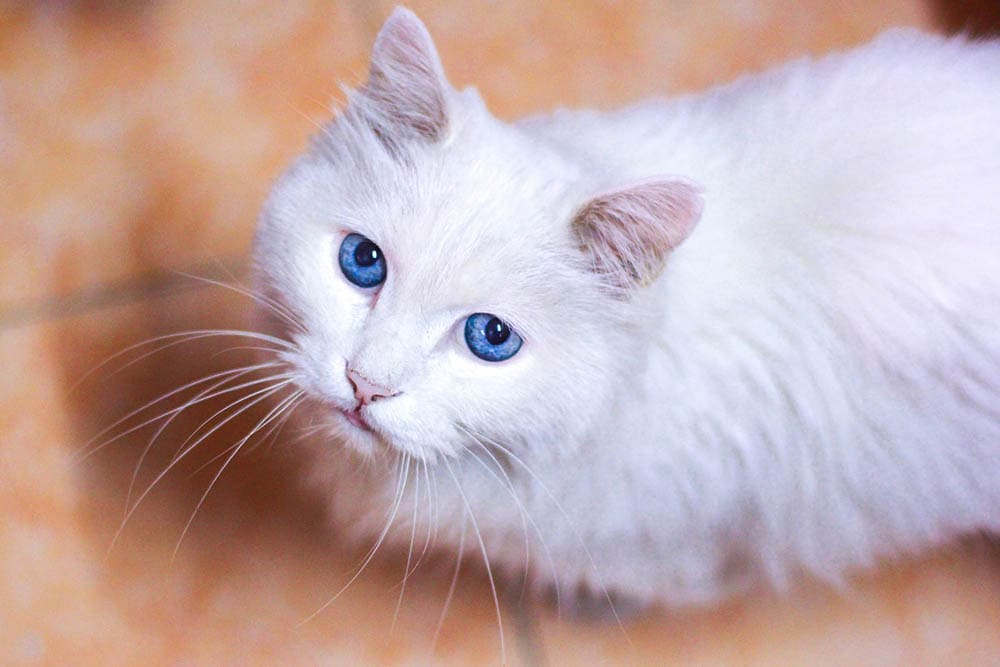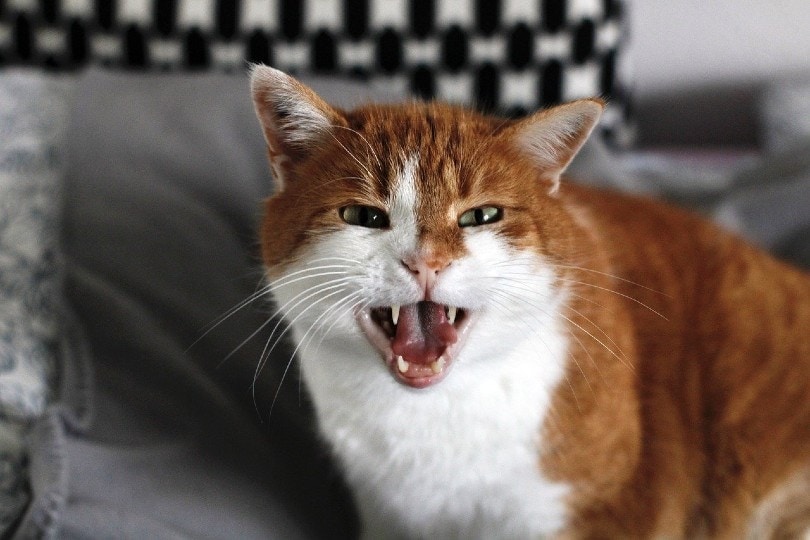
If you own a cat, the chances are that you’ve experienced the cold shoulder on a few occasions. Perhaps the worst part of cat ownership is the sudden hiss or a painful nip on the finger when you thought that you were both enjoying a grooming session. It can be alarming behavior, especially if this is your first cat.
Most cats are naturally friendly. They’ll only hiss at you if something is wrong or they want to be left alone. Rest assured that it doesn’t mean your newly adopted cat hates you.
Here are a few possible reasons that your cat is hissing at you, so you can determine whether your cat simply needs space or a visit to the veterinarian.
 The 7 Reasons That Your Cat Hisses at You
The 7 Reasons That Your Cat Hisses at You
1. Overstimulation
Some cats will sit on your lap all day and demand scratches at every opportunity. Others will tolerate only a small amount of attention before running for cover. The length of time that your cat enjoys attention depends on their individuality. No matter your cat’s tolerance, though, once they reach the point of “Enough!”, they’re likely to hiss or swat at you to get you to leave them alone.
Many people are surprised when their cat decides that they no longer want to be touched, especially when they’ve been enjoying being pet for a while. Most cats don’t leap straight into a violent response, though, and do present warning signs. Here are a few to keep an eye out for:
2. Pain
Cats might be experts at keeping their pain to themselves, but they’re also not shy about telling you when something hurts. If you accidentally touch a sore spot on their back or leg, they’ll lash out instinctively. If your aging cat is suffering from arthritis, you might have accidentally put too much pressure on their aching joints by picking them up.
Pain is the biggest reason that an otherwise friendly cat will suddenly turn on you. It doesn’t mean they hate you; they’re just cranky about being in pain. Your cat may grumble about a stomachache they’re trying to sleep off or an injury from their outdoor adventures.
Some pain might even be caused by a serious medical condition, which you’ll need a veterinarian to diagnose and treat.

3. Protection of Kittens
Mothers of all species are fiercely protective of their young. Although domestic cats are reliant on us for many of their needs, they act the same way. While some mother cats are happy to share the responsibility of taking care of their kittens with you, others are much more protective.
A mother cat hissing at you if you approach her litter doesn’t mean she hates you. It also doesn’t mean you’ll never be able to say hello to the kittens; it’s just her instinct to protect her young.
You should always leave your cat to tend to her litter alone for a few weeks before trying to introduce yourself to the kittens. This will allow the kittens to develop properly before you start socializing them.
4. Startled
Sometimes, your cat hisses as a reflexive reaction if they’re suddenly startled. While cats are almost impossible to sneak up on, there are occasions when they’re distracted and you might take them by surprise.
If they’re distracted by something when you approach, aren’t used to being around you, can’t see or hear well, or are generally nervous or timid, they’re more likely to startle when you touch them.
Remember to make sure your cat knows that you’re there before petting them. You should give them plenty of warning while they’re getting used to you or your home or if they have a health issue that interferes with their ability to notice your approach.

5. Stress
Although they seem aloof and uncaring, cats are incredibly sensitive animals. A change in their routine can put them on edge and make them more likely to hiss or lash out at you unexpectedly.
Inviting somebody new into your home, whether it’s a guest, a new roommate, a baby, or even another pet, can put your cat’s nose out of joint for a few days. Something as simple as a trip to the vet or rearranging the furniture can set some cats off too.
In this case, their hissing is more instinctive. It’s a reaction developed by their wild ancestors to keep themselves safe in new situations and hasn’t faded. Try to keep your cat’s routine as stable as possible. If you do have to change it for whatever reason, reassure your cat and give them space if they need it.
6. Territorial
Similar to being stressed out by newcomers in their home, your cat can also become territorial when faced with people or pets that they deem to be intruders. A new kitten, puppy, or guest can all be seen as invaders in your cat’s space. Spotting a neighborhood cat walking along the garden wall through the window might put your cat in a terrible mood too.
Usually, when your cat is grouchy about their territory, it’s often misdirected rage that you encounter when they hiss at you. If they can’t chase off the cat sitting on the outdoor fence, for example, some cats will grouch at you instead. This doesn’t mean you’re a terrible cat owner; it’s just your cat directing their bad mood at you.

7. Unfamiliarity
Introducing a new cat to your home is exciting, but it can also be disheartening if your first four-legged friend hisses at you whenever you approach them. This doesn’t mean your cat will never trust you, but they’re currently wary about their new situation.
Give your new cat time to get used to you and your home, and gently encourage them to spend time with you without making them feel forced or threatened. The best solution is to give them space and wait for them to come to you.
Scents can also play a part in whether your cat recognizes you. If you said “hi” to a strange dog or met a cat during your walk to the grocery store, your cat will be able to smell the strange animal on your skin or clothes. The scent of an unfamiliar animal or even perfume that interferes with your natural scent can make your cat wary about you.
 What to Do When Your Cat Hisses at You
What to Do When Your Cat Hisses at You
Hissing doesn’t mean your cat hates you, even if it is disheartening to experience. It is, however, a warning that your cat isn’t in the mood for attention. To make sure your cat is as happy as possible and to avoid a more aggressive reaction, you should take a step back when your cat hisses at you, as well as follow these tips.
Give Them Space
If your cat is overstimulated or just plain grumpy, the only thing that you can do is give them space. Although it can be tempting to reassure your cat that everything’s okay or pester them to figure out what’s wrong, it’s not always a good idea.
Cats appreciate having time to themselves. If you bother them too much when they’re already on edge, their hissing will quickly turn into painful bites or a swat with their claws. Let them cool off, and try to pet them later when they’re calm. If they’re having a particularly bad day, wait for them to come to you.

Provide Escape Routes
One of the reasons your cat may hiss at you is that they’re feeling threatened. When cats feel like they’ve been cornered with no escape route, they’re likely to get aggressive if their hissed warning doesn’t convince you to leave them alone.
If you’ve recently adopted a new cat, make sure you give them plenty of space to hide if they feel uncertain. Should they dart for cover while you’re interacting with them, let them go and try again later. Don’t let them feel trapped in your eagerness to welcome them home.
Escape routes can be anything from cat condos to the underside of the bed or the top perches of a cat tree — anywhere that’s out of the way of other pets, children, or you.
Reward Calm Behavior
You mustn’t scold your cat for hissing at you. This can make their fear or stress worse. Instead, wait until your cat is calm again, and reward their good behavior — like emerging from their hiding spot — with a game using their favorite toy or a treat. Remember to back off again if your cat shows signs that they’re getting agitated.
The idea here is to teach your cat to associate you with good things. By rewarding calm, friendly interactions, you’ll be strengthening the bond between the two of you.

Visit Your Veterinarian
While hissing by otherwise friendly cats can be explained away by overstimulation or stress, sometimes it’s a medical issue. If your cat is in pain, you might need a veterinarian to diagnose their condition and properly treat it. Pay attention as to whether your cat is showing other symptoms of an underlying health issue, such as lack of appetite, change in behavior, or lethargy.
 Conclusion
Conclusion
Cats use hissing as a way to vocalize a warning when they don’t like something. This doesn’t mean you’ve done something that’s made them hate you; they just want to be left alone for a while. Perhaps you accidentally touched them in a spot that hurts. No matter the reason that your cat is hissing at you, it’s important to give them time to themselves before trying to cuddle with them again.
Featured Image Credit: Fang_Y_M, Pixabay

 The 7 Reasons That Your Cat Hisses at You
The 7 Reasons That Your Cat Hisses at You What to Do When Your Cat Hisses at You
What to Do When Your Cat Hisses at You



